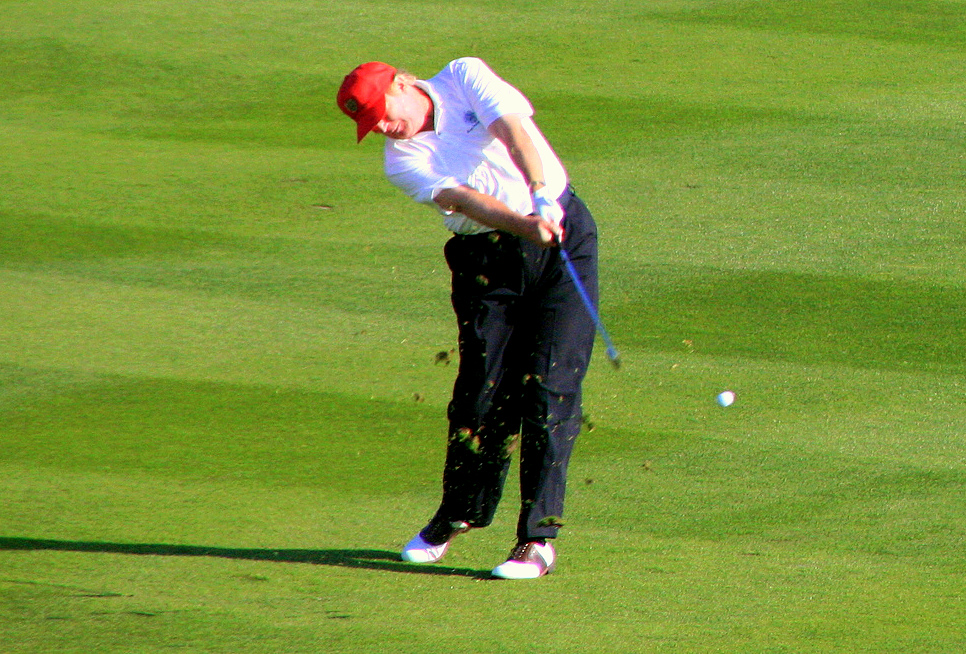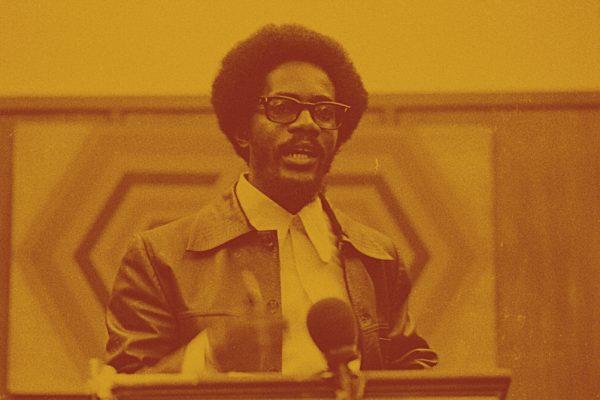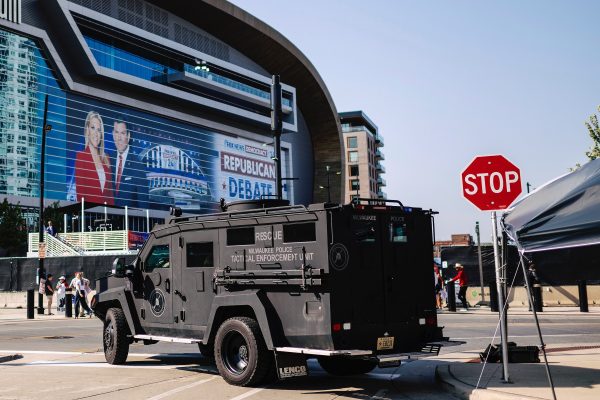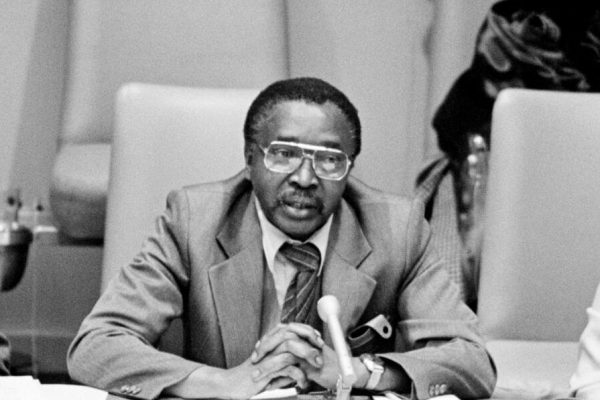Police officers are required to guard the heads of people they arrest as they load them into the back seat of a police car, lest they bump their heads. The current president told a gathering of police this summer that they should reconsider this gesture. “Please don’t be too nice,” he said, as if niceness was the issue: “You can take the hand away, OK?” Really at issue here is not any supposed niceness, but the fact that an officer’s hand on a suspect’s head is a vivid and iconic example of official care in public, one of the very few we have left in our increasingly post-welfare state democracy. It is made necessary by the handcuffs, of course, which put people off balance.
Trump's paternalistic language of care draws an exceptional circle around whites only.
The requirement of public care is often—even routinely—ignored or violated, as the name Freddie Gray so painfully reminds us. And so that outstretched hand, owed to any and everyone, including the criminal, the indigent, the suspect, the marginal, the unfortunate, the needy, is especially voluble these days. Perhaps that is why the president singled it out.
Images from the Unite the Right rally in Charlottesville depicted scenes of a different kind of public care: one man poured milk over another’s face to counter the effects of Mace, then gently tilted his fellow Nazi’s chin in his hand as if to ask: was that better? One of the things that drew the alt-right marchers to gather was the desire to enjoy such care in public. The Unite the Right organizers noted the importance of coming out, being seen, working together in real life. “We don’t have the camaraderie,” one alt-right marcher said, “we don’t have the trust level that our rivals do . . . and that camaraderie and trust is built up through activism.” Describing themselves as “showing up,” being “part of a larger whole,” and “having a great time,” the marchers made clear their desire to create the conditions for mutual care rather than private isolation: they wanted to see and be seen, together, in public. Claiming camaraderie, they were building trust, care, and concern.
The public they want to be part of is exclusively white and so the busy, messy, conflicted space of public life and activism now does not answer to their need, though it does offer some of what they crave. It is full of care for others, and care for the world we share with others, as the political theorist Hannah Arendt would put it. But to belong to that world, you have to be willing to take your place among others. And this, the alt-right marchers were not willing to do. Chanting “Jews will not replace us,” the men at that march in Charlottesville wanted the world without the share. They wanted a public just for themselves. This is the dangerous dream of all ethno-nationalists: they want the public, without the politics.
The alt-right marchers in Charlottesville share the dangerous dream of all ethno-nationalists who want the public, without the politics.
The alt-right demand for public life is part of a quest to retake the public they or their parents abandoned a few decades ago. After integration or desegregation, white disinvestment and abandonment of public things often comes next. One example, explored by Jeff Wiltse, author of Contested Waters: A Social History of Swimming Pools in America, is public swimming pools, which were racially-desegregated in the late 1940s and the 1950s and then abandoned by whites. “In city after city after city . . . the overall attendance to the pool would plummet,” Wiltse says. Whites “didn't stop swimming . . . They built private club pools, which were able to . . . legally discriminate against black Americans. Or they built at-home residential pools, so they could really enclose themselves off from the larger public and truly exercise control over who they were swimming with.”
The current president’s preference for his private, members-only club, Mar-a-Lago, over the White House, is also a preference for the private pool over the public thing. What Mar-a-Lago members buy for their $200,000 membership fee is control over access and the company they keep. Here neoliberalism, which promotes privatization for its own reasons, aligns with white supremacy, which wants control over access.
Decades after abandoning rather than integrating public life, emboldened by a president and a party that coddle rather than condemn them, white supremacists want to experience public enjoyment, but without the divisions, thrills, and conflicts that vivify contemporary public life. Perhaps the same is true of police in St. Louis, Missouri who, last week, having cleared a street of protestors, went on to take also the protestors’ chant—“Whose streets? Our streets!”—as if that chant, and the hard-earned civic power that gave rise to it, were theirs for the taking. In the wake of the bench trial acquittal of former St. Louis patrolman, Jason Stockley, in the 2011 killing of Anthony Lamar Smith, protestors’ calls for justice and racial equality are worthy of care and concern, not mockery. The protesters are part of the very public the police are meant to serve.
A local activist said to a crowd at a Sunday gathering after the horrific events at Charlottesville, “This is what we deal with every day, being African-American . . . and not many of us have come out until it’s too late.” She reminded me of a story about a European rabbi who went to sleep every night with his shoes arranged just so, by the side of his bed. Why, his students asked, do you do that? He wanted to be ready, the rabbi said, in case the Messiah turned up in the middle of the night. He did not want to be too late.
The story is told now as an example of great personal righteousness. What faith it takes to prepare one’s shoes every night, to be ready for such an unlikely event! But, really, there is no way the rabbi thought he would need his shoes if the Messiah came in the middle of the night. He let his students witness his strange ritual, knowing they would ask, hoping they might learn. The shoes are part of a practice of care. To arrange them just so every night is to cultivate, daily, anticipation of another world and to live now dedicated to the task of turning this world into a better one. The rabbi was teaching his students not to wait, lest they be too late, but to live with care and concern now. He may have been personally righteous, but he was discharging the duties of his office as communal leader when he set out his shoes.
To care is to cultivate anticipation of another world and to live now dedicated to the task of turning this world into a better one.
The office of the presidency has the same obligations to model and express care and concern. But the current president’s care is uncaring and his voice loudly telegraphs a lack of concern. In Alabama the other night, he spoke of his twitter tiffs with Kim Jong Un and described vividly the dangers he could unleash. North Korea could explode a “massive weapon” causing “tremendous, tremendous calamity where the plume goes.” Perhaps sensing some anxiety in the crowd, Trump then told the crowd not to worry. “Maybe something gets worked out and maybe it doesn’t, but I can tell you one thing: You are protected. OK? You are protected. Nobody’s going to mess with our people.” And later: “You’ll be OK. We won’t let anything happen to you.”
This expression of care dangerously and disingenuously positioned the crowd as personally dependent on him, and his personal kindness—“we won’t let anything happen to you”—rather than bound together, by his office, as citizens of a diverse and potentially vulnerable public. Moreover, Trump used this paternalistic care to draw an exceptional circle around white Alabamians, to whom he improbably dared to claim he belonged. “I understand the people of Alabama. I feel like I’m from Alabama, frankly,” the president said. “Isn’t it a little weird when a guy who lives on Fifth Avenue in the most beautiful apartment you’ve ever seen, comes to Alabama and Alabama loves that guy? I mean, it’s crazy. It’s crazy.” It is.
He closed the circle of belonging that bound him to his Alabama audience, most of whom could never gain access to Mar-a-Lago, much less his Manhattan apartment, when he referred to black athletes of conscience as “sons of bitches,” and called for them to be thrown off the field by their team owners. The NFL has rightly rebuffed his instruction. And individual athletes as well as coaches and teams have drawn their own circles now, too, taking the knee en masse, linking arms in solidarity, or responding to Trump’s follow-up tweet disinviting Basketball MVP Steph Curry to the White House, after Curry and his teammates refused the invitation months ago.
But in Alabama, and elsewhere, they know what they heard. He says he has their backs. And they know that in the unlikely event any of them is ever arrested, someone’s hand will surely hover carefully over their heads.








